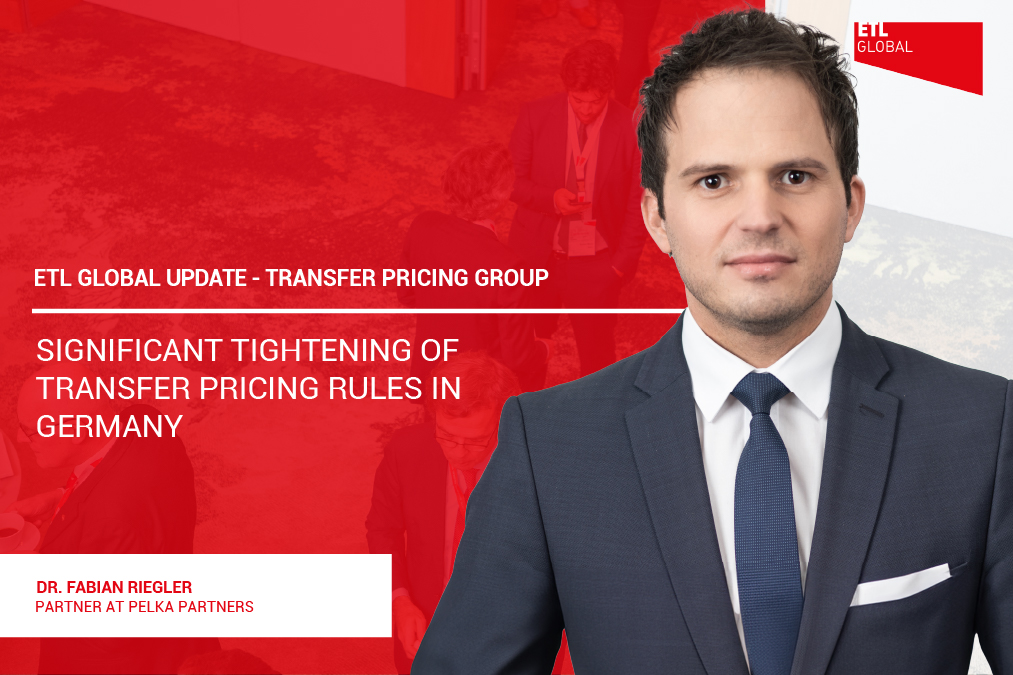I. Transfer Pricing in Germany: Initial Situation
Business processes of a globally active company are distributed worldwide due to the increasing convergence of markets. Those countries in which companies are active would understandably like to tax a portion of the profits generated by value creation that takes place in their country. With increasingly complex business models and ever more fragmented business processes, this is becoming more difficult for the states and they are afraid of profit shifting. The issue of transfer pricing and its documentation is therefore increasingly becoming the focus of tax authorities and tax auditors. Thus, in implementation of the EU Directive 2021/514 (DAC-7), the German legislator has enacted a number of legislative changes that also affect the topic of transfer pricing. With effect from 1st January 2025, the statutory regulations in Germany will be tightened with regard to the tax authorities’ ability to request transfer pricing documentation and the deadlines for its submission.
II. Current legal situation in Germany regarding transfer pricing
In Germany every taxpayer is obliged to record intragroup business transactions that take place across German borders in a timely manner. In particular, this means that if the German company has intragroup business relationships with foreign companies, transfer pricing documentation must be prepared and that this should be done close in time to the execution of the transaction to be documented. The main purpose of the transfer pricing documentation obligation is to ensure that the taxpayer complies with the requirements of the arm’s length principle and that the tax authorities receive the necessary information to be able to evaluate the appropriateness of the prices charged. This is intended to prevent profits generated in Germany from being transferred abroad as a result of incorrect pricing within a multinational group.
According to the current legal situation in Germany, the tax office can request the submission of a transfer pricing documentation only as part of a tax audit. In this respect, the auditor is not obliged to request a transfer pricing documentation, but can decide at his own discretion whether he considers the submission of a documentation to be useful for the tax audit. A transfer pricing documentation is therefore currently only relevant in Germany if a tax audit is carried out at all and only if the specific tax auditor carrying out the audit considers the submission of the documentation to be necessary. If he does, a period of 60 days begins with the request from the auditor, within which the taxpayer is obliged to submit the documentation. If the documentation is not submitted, the tax office can impose a fine on the taxpayer and is also allowed to increase the company’s profit by way of an estimate.
The obligation to prepare a transfer pricing documentation in Germany results directly from the German tax law and exists independently of the submission request made by the auditor. However, due to the fact that the records only become relevant once the request for submission has been made, in many cases the preparation of the documentation is only started after the request. Since it is not clear beforehand whether the transfer pricing documentation will be required at all, some German companies wait until an actual request is made by the auditor before they start the preparation of the documentation. Depending on how extensive the taxpayer’s business relationships with related parties are, this approach can make it difficult to submit the requested documentation to the tax office within the 60-day deadline. It is therefore also worthwhile – in line with the intention of the law – to have the relevant documentation prepared close to the time of the transaction prior to the request by the tax office.
III. Modification of the transfer pricing rules as of 1st January 2025
Beginning on 1st January 2025, a new law will apply in Germany constituting a significant tightening of the German transfer pricing rules. The new rules bring three modifications that will lead to a big change in the current practice.
1. Option to request a documentation at any time
The tax office will be entitled to demand the submission of a transfer pricing documentation at any time. From the year 2025 onwards, a documentation in Germany will no longer only be relevant in the context of a tax audit, but may be necessary at any time. German companies that maintain cross-border business relationships with other related companies must therefore be prepared to submit a transfer pricing documentation at all times. For example, the tax office may also request the submission of a transfer pricing documentation as part of the annual corporate income tax assessment.
2. Submission obligation during a tax audit
Should a tax audit take place, the company being audited is obliged to submit the transfer pricing documentation to the tax auditor without the latter having to request its submission separately. The obligation to submit a transfer pricing documentation as part of a tax audit will generally apply in Germany from 2025 onwards and will therefore no longer be at the discretion of the specific tax auditor carrying out the audit. For companies in Germany that are regularly subject to tax audits, this means that there is no longer a scenario in which they do not need to submit a transfer pricing documentation.
3. Reduction of submission deadline
The 60-day deadline for the submission of a transfer pricing documentation will be reduced to 30 days. In cases in which the transfer pricing documentation is requested outside of a tax audit, the deadline begins on the day on which the taxpayer receives the request for submission. In cases of a tax audit, on the other hand, the deadline already begins with the notification of the audit order. The shorter deadline of 30 days will make it almost impossible to prepare a documentation for complex business transactions in time if it is only started after the tax office’s request for submission.
IV. Our advice
Due to the changes that will come into force on 1st January 2025, the handling of transfer prices in Germany is expected to change significantly. This applies not only to business transactions that are carried out from 1st January 2025 onwards, but also to transactions that are currently being carried out or have already been completed in the past. For example, if a tax audit in 2025 covers the years 2021, 2022 and 2023, the documentation must be submitted for all three years. We therefore recommend that taxpayers familiarise themselves with the topic now and start preparing a transfer pricing documentation at an early stage with the support of a tax advisor. This particularly applies to companies that are regularly subject to tax audits, as there will no longer be any way for them to avoid submitting a transfer pricing documentation. However, the recommendation also applies to other companies, as it will hardly be possible to prepare a transfer pricing documentation in time due to the shortened submission deadline if it is only started after being requested by the tax office.






